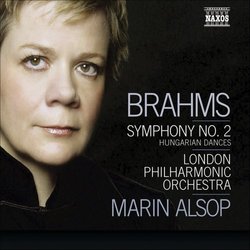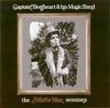| All Artists: Brahms, Alsop, London Philharmonic Orchestra Title: Brahms: Symphony No. 2 - Hungarian Dances Members Wishing: 0 Total Copies: 0 Label: Naxos Original Release Date: 1/1/2005 Re-Release Date: 10/11/2005 Genres: Dance & Electronic, Classical Style: Symphonies Number of Discs: 1 SwapaCD Credits: 1 UPCs: 747313242924, 747313242924 |
Search - Brahms, Alsop, London Philharmonic Orchestra :: Brahms: Symphony No. 2 - Hungarian Dances
 | Brahms, Alsop, London Philharmonic Orchestra Brahms: Symphony No. 2 - Hungarian Dances Genres: Dance & Electronic, Classical
Here, Marin Alsop follows up her successful recording of Brahms's First Symphony with an equally fine Second. The first movement has great warmth but moves ahead with conviction; the second is devoid of any unwanted densit... more » |
Larger Image |
CD DetailsSynopsis
Amazon.com Here, Marin Alsop follows up her successful recording of Brahms's First Symphony with an equally fine Second. The first movement has great warmth but moves ahead with conviction; the second is devoid of any unwanted density of tone; the third has real class, and the final movement is exciting, with dazzling brass. The selection of Hungarian Dances is varied and handsomely performed. At this price, this is a front-runner. --Robert Levine Similar CDs
|
CD ReviewsAlsop & LPO: Mellifluous Brahms is Hearty Musical Fare Dan Fee | Berkeley, CA USA | 12/23/2006 (5 out of 5 stars) "I approached this second disc in the Marin Alsop series on Naxos with some caution, given my mixed reactions to the first symphony on SACD, as well as some of the down sides of the comments the Amazon posted reviewers have made. My objections to the Alsop First Symphony involved mostly the dislocated sonics that came from using that markedly unwise venue, the Watford Colosseum. I like Alsop's approach to the composer well enough to actually wish to be able to hear it, well. Her tendencies to bring out Brahm's polyphony without unraveling the larger melodic/harmonic forward motion only makes sound and aural staging more pertinent concerns. So as a happy starting note, one can see this Second Symphony has been recorded in another, much better venue, London's Blackheath Concert Hall. Catching this break, one immediately wishes we had another go at SACD. (So I waited and waited before trying this second out. What is Naxos thinking these days? Do any of the company people actually listen to their own catalog?) On the disc filler of eight of the orchestrated version of the Hungarian Dances, we return to the Watford. Oh well, give that venue another chance I suppose, so long as it doesn't get to sabotage one's potential enjoyment of the Second Symphony. My steadfast standard in the second has involved an old, wonderful stereo recording, led by Pierre Monteux with the Vienna Philharmonic. Some day it may get remastered again, and if Universal Classics lets Sony BMG lead the way, we might even get an SACD hybrid disc like the BMG Living Stereo series. Other touchstones have of course included some big and some not so big players: Haitink & the Concertgebouw, Bohm with Vienna, the last Gunter Wand set with the North German Radio Orchestra, Sir Adrian Boult with the LPO/LSO, Dohnanyi with Cleveland, Levine with Vienna, Mackerras in Scotland, Marek Janowski with Liverpool, and the younger Thomas Sanderling with London's Philharmonia. Old masters have lasted, like Kurt Sanderling, Bruno Walter, Otto Klemperer, George Szell. Right from the start, Marin Alsop adopts a flowing, moving tempo, nevertheless consistent with the gemutlichkeit essence of the opening melody and orchestral texture. I find myself mystified by the reviewers that complained of her tempo being too slow to serve this music. Of course I like my Brahms slow, provided the conductor and players plan to do something with all the music going on, like the Sanderlings, say, or Pierre Monteux. So far as I can hear, her approach to the second reminds me of her way with the first. She is adept at balancing the three sides of this complex composer, the Late Romantic Brahms who is so full of deep humanistic emotion, the music scholarly Brahms who learned his polyphony from studying all the old Medieval and Baroque masters, and the futurist Brahms whom Schoenberg much admired. By the time the work ends, I realize she has finished things as well as she began them. It probably doesn't hurt that the LPO has a strong history of its own in this composer's oeuvre. Then we jump suddenly into the Watford Colosseum which still has all the recorded sonic deficiencies I nagged about in my review of the first symphony. It is not awful sound, just terribly displaced and floating disembodied in that great space, a bit like elevator music written larger than life by some close-up magic that quickly earns my ear's worry. If you like the Hungarian Dances as background music, and you are not listening for too much in that music, you will probably sail right on through your day. The Third Symphony is due out, soon. I hope it avoided the Watford. I hope it continues to show the gifts of conductor and band, as the first two discs have done. Will we ever get these in super audio? Naxos?" If you like it slow... Gullible | New York | 03/29/2010 (2 out of 5 stars) "...then this is the contemporary Brahms' Second for you. A worthy heir to the Bernstein tradition. Quite ponderous. Don't listen late at night and expect to make it to the end. (On occasion, that's a good thing, hence the second star.) If you must own every recording of Brahms' Second, then you must buy this one. If you are relatively new to the work, start with a von Karajan, for example the DG re-mastering of the early 60's performances of the Second and the Third."
|

 Track Listings (12) - Disc #1
Track Listings (12) - Disc #1


